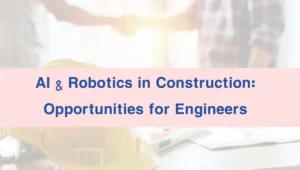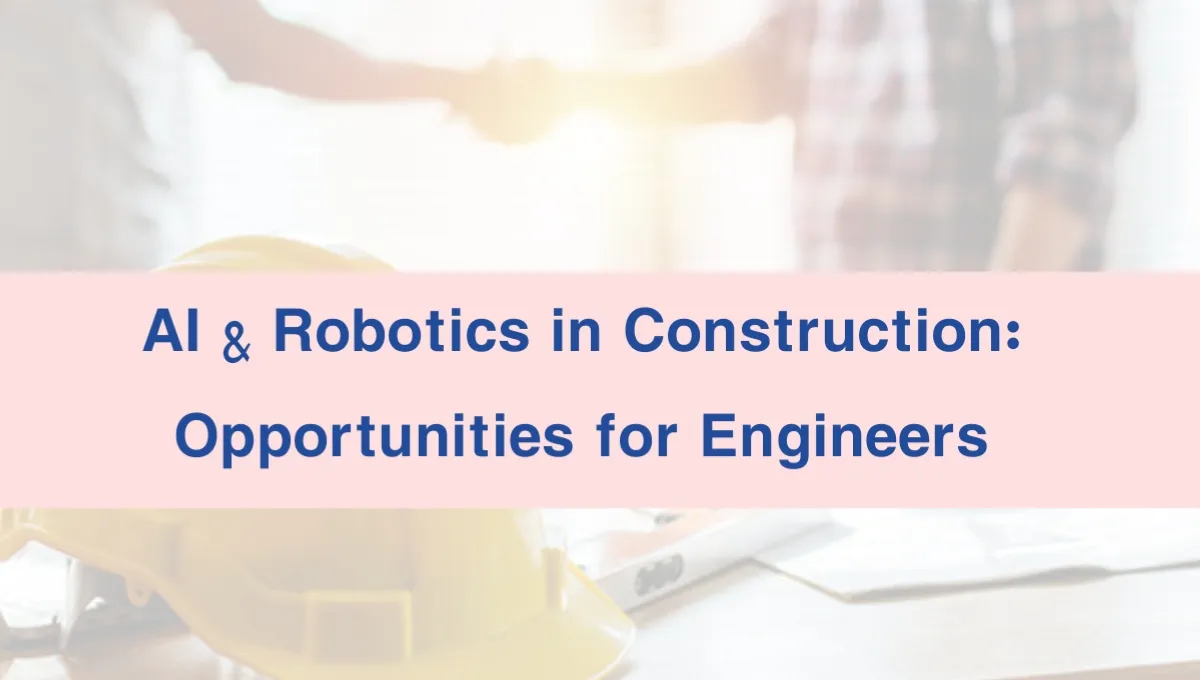AI & Robotics in Construction: Opportunities for Engineers. The construction industry, one of the largest employment sectors in India, is undergoing a digital transformation. In 2025, technologies like Artificial Intelligence (AI) and Robotics are no longer futuristic concepts—they are real game changers. From smart project planning and safety monitoring to autonomous machinery and 3D printing robots, these technologies are revolutionizing construction sites.
For Indian engineers, AI and robotics bring new job opportunities, higher salaries, and the need for new skill sets. In this blog, we will explore how AI and robotics are transforming construction, the types of opportunities available, and the future scope for engineers.
AI & Robotics in Construction: Opportunities for Engineers
1. How AI is Changing Construction
AI is helping construction companies save costs, improve accuracy, and finish projects on time.
Applications of AI in Construction:
- Project Planning: AI software predicts delays, optimizes schedules, and improves resource allocation.
- Safety Monitoring: AI-enabled cameras detect unsafe practices on-site.
- Predictive Maintenance: AI sensors monitor equipment health to prevent breakdowns.
- Cost Estimation: AI algorithms generate accurate budgets using past project data.
- Quality Control: AI-powered drones scan sites to detect defects in concrete or steel.
Impact: Engineers skilled in AI applications are highly valued by construction firms.
2. Role of Robotics in Modern Construction
Robots are reducing human effort and improving efficiency in challenging site conditions.
Uses of Robotics in Construction:
- Bricklaying Robots: Machines that lay bricks faster than human workers.
- Welding & Cutting Robots: Precision robotic arms used in high-rise and industrial projects.
- Demolition Robots: Remote-controlled machines for safe demolition in urban areas.
- 3D Printing Robots: Robotic arms building houses layer by layer using concrete.
- Autonomous Vehicles: Self-driving trucks, bulldozers, and cranes for site operations.
Impact: Robotics makes construction faster, safer, and more cost-efficient.
3. Opportunities for Engineers in AI & Robotics
Engineers with knowledge of AI and robotics are in demand across civil, mechanical, and electrical sectors.
Job Roles for Engineers:
- AI Engineer (Construction Data Analytics): Works on predictive modeling and project optimization.
- Robotics Engineer (Construction Machines): Designs and maintains robots used on-site.
- BIM + AI Specialist: Integrates AI into Building Information Modeling for smart design.
- Automation Engineer: Develops PLC & SCADA systems for robotics in construction.
- Safety Engineer (AI-enabled): Monitors site risks with AI-based tools.
4. Required Skills for Engineers
To grab these opportunities, engineers need to upskill in:
- Software Tools: AutoCAD, Revit, BIM, MATLAB, TensorFlow.
- Programming Knowledge: Python, C++, Java (for AI and robotics).
- Automation & Control: PLC, SCADA, IoT systems.
- AI Skills: Machine learning, data analytics, computer vision.
- Robotics Knowledge: Kinematics, robotics design, mechatronics.
5. Indian Companies Adopting AI & Robotics
- Larsen & Toubro (L&T): Using AI in metro and highway projects.
- Tata Projects: Adopting BIM + AI integration.
- Aparna Constructions & Infosys Campuses: Using 3D printing robots for buildings.
- Startups: Many Indian startups are innovating with drone and robotic technologies for site monitoring.
6. Global Opportunities for Indian Engineers
Countries like UAE, USA, Germany, Japan, and Singapore are investing heavily in smart construction technologies.
- Engineers with AI & robotics skills can get high-paying jobs abroad.
- Robotics engineers in construction earn ₹15–25 LPA in India and ₹40–80 LPA internationally.
7. Challenges of AI & Robotics Adoption
- High Initial Cost: Robots and AI tools require heavy investment.
- Skill Gap: Lack of engineers trained in AI and robotics.
- Job Fears: Workers fear robots replacing human jobs.
- Integration Issues: Companies still rely on traditional construction practices.
But: These challenges are opportunities for engineers who learn the right skills.
8. Future of AI & Robotics in Construction (2025–2035)
- Smart Cities: AI-driven urban planning and infrastructure design.
- Digital Twins: Virtual models of entire projects managed by AI.
- Fully Automated Construction Sites: Robots handling 70–80% of tasks.
- Sustainable Projects: AI optimizing energy efficiency and green building designs.
Conclusion: Engineers skilled in AI & robotics will be future leaders in construction.
Conclusion
AI and robotics are transforming construction into a technology-driven industry. From drones monitoring sites to robots building houses, these technologies are creating new career opportunities for engineers.
For Indian engineers, this is the best time to learn AI, robotics, and automation to stay ahead. Companies in India and abroad are actively hiring professionals with these skills, making it one of the most rewarding career paths in 2025.
FAQs
Q1. How is AI used in construction projects?
A1. AI is used in project planning, safety monitoring, cost estimation, and predictive maintenance.
Q2. Which robots are used in construction?
A2. Bricklaying robots, welding robots, demolition robots, and 3D printing robots.
Q3. Do civil engineers need to learn AI?
A3. Yes, civil engineers benefit from AI in BIM, project planning, and safety monitoring.
Q4. What is the salary of AI engineers in construction in India?
A4. AI engineers in construction earn ₹8–18 LPA, while robotics engineers earn ₹12–25 LPA.
Q5. What is the future of robotics in construction?
A5. Robotics will handle most repetitive and dangerous site tasks, improving speed and safety.
- Top 10 Construction Companies in India to Work For in 2025
- Mechanical Engineering Jobs in Renewable Energy Sector
Follow Our Channel: Click here
Home Page: Click here

